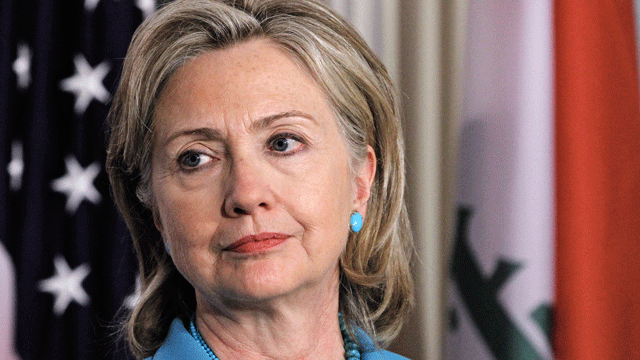
In this July 13, 2010 file photo, Secretary of State Hillary Rodham Clinton listens during a joint press availability with Iraqi Foreign Minister Hoshyar Zebari, not shown, at the State Department in Washington.(AP)
ISLAMABAD -- U.S. Secretary of State Hillary Rodham Clinton has arrived in Pakistan at the start of a tour of South Asia aimed at refining the goals of the nearly 9-year-old war in Afghanistan.
She wants to push neighboring countries to cooperate in the fight against al-Qaida and Taliban extremists.
Clinton landed Sunday in Islamabad where she will underscore the need for Afghan-Pakistani cooperation in winning the war. She will also announce plans to beef up U.S. development assistance to Pakistan, which is rife with anti-American sentiment.
U.S. lawmakers are increasingly questioning the course of the war. The number of U.S. and NATO casualties in Afghanistan is on the rise. Corruption is a deep problem in Afghanistan, and members of Congress wonder about the utility of massive aid to both Afghanistan and Pakistan.
Clinton will attend an international conference in Kabul on Tuesday where the Afghan government is expected to outline plans to improve security, reintegrate militants into society and crack down on corruption. She also plans to stop in Pakistan to push greater cooperation between Islamabad and Kabul.
Clinton, who left Washington on Saturday, will meet up later in the week with Defense Secretary Robert Gates in South Korea, where tensions with the communist North have risen after the sinking of a South Korean warship that was blamed on the North.
She will finish her trip in Vietnam for discussions with regional leaders. Among the topics will be the upcoming elections in Myanmar.
At the Kabul conference, she will renew Washington's commitment to support Afghan President Hamid Karzai's government, but press him to follow through on reform pledges he made earlier this year.
Richard Holbrooke, President Barack Obama's special representative for Afghanistan and Pakistan, has said the conference "will be a very important international demonstration of support" for Karzai and his administration.
But Holbrooke acknowledges concerns that the war and the reconstruction effort are not going as hoped or planned.
He told Congress this past week that "there are significant elements of movement forward in many areas, but I do not yet see a definitive turning point in either direction."
Last month was the deadliest of the war for international forces: 103 coalition troops were killed, despite the infusion of tens of thousands of new U.S. troops. So far in July, 54 international troops have died, 39 of them American. An American service member was killed by a blast in eastern Afghanistan on Saturday, and an American died in a blast in the south on Friday.
At the same time, international troops working with Afghan forces say they have killed or captured dozens of senior insurgent figures since April as they aggressively step up operations against the Taliban leadership. But those successes haven't slowed the pace of militant attacks, which continue daily, killing dozens of people each month.
The administration has said it will review its Afghan strategy at year's end. The slow progress against the Taliban and the disruptive effects of the firing of the outspoken American commander there last month, have led to a growing unease among many in Congress, including leading members of Obama's own party.
Democratic Sen. John Kerry, chairman of the Senate Foreign Relations Committee, said it's not clear that the administration has a solid strategy for prevailing. The committee's top Republican, Sen. Richard Lugar, decried "a lack of clarity" about U.S. war goals.
Democratic Sen. Carl Levin, who leads the Senate Armed Services Committee, has said that while there remains "solid support" for the war among Democrats, "there's also the beginnings of fraying of that support."
In the House, Democratic Rep. Nita Lowey has put a hold on nearly $4 billion in assistance to Afghanistan, demanding that allegations of corruption be addressed and that the Afghan government be held accountable.
The Associated Press contributed to this report.




